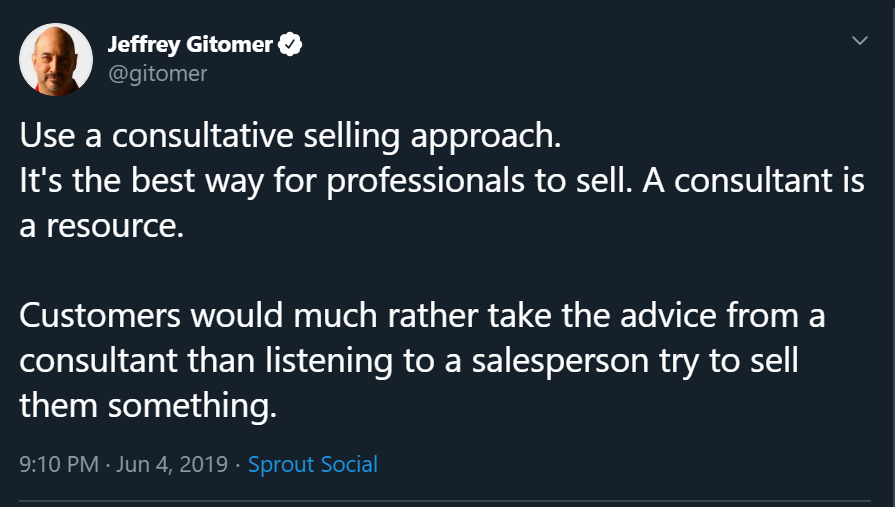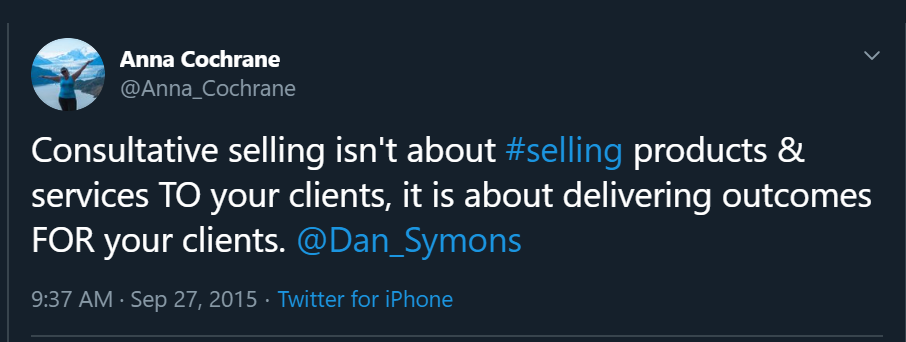Consultative Selling is the delivery system for value. In return for improved customer outcomes, Consultative Selling delivers improved margins back to you.
- Consultative Selling by Mark Hannan
Popularized through Hanan’s 1970 book, consultative selling has been a game-changing sales strategy and has heavily influenced how people conduct sales today.
The introduction of consultative selling made performance and returns be the main elements to lure a potential customer. Meanwhile, product-centered selling fell back on suppliers who could not sell or price their product because of a lack of understanding of its applied value. So, while consultative sellers concentrated on selling a brand, the others focused on selling commodities — opting to kill their competitors overgrowing their customer base.

Today, 57% of sales executives agree that buyers are less dependent on the sales process than they were a few years ago, which, in turn, has led to the most successful companies employing consultative selling for their top tier accounts (at the very least).
But can it benefit you in any way?
To answer that, you need to first expand your understanding of what consultative selling is and how it is different from traditional selling strategies.
What Is Consultative Selling?
Consultative selling emphasizes on offering value to the prospect by directly satisfying their needs. It creates a relationship with the prospect to understand their unique requirements before matching them up with the benefits that your product offers.
In transactional selling, the prospect’s decision to purchase is limited to the price, features, and availability of the product. On the other hand, consultative selling’s focus is on offering value to the customer — more concerned about why the customer wants to buy something instead of what they want to buy.
To know more about what consultative selling is, go over this video.
Consultative Selling Vs. Transactional Selling: Which One Should You Choose?
While transactional selling is a short-term sale in which the buyer is already aware of their requirement, consultative selling is a long-term, more complex process that requires both the seller and the buyer to collaborate.
Oftentimes, people find themselves in a dilemma trying to make up their minds over what to choose between consultative selling and transactional selling. To that end, outlined below are a few advantages consultative selling has over transactional selling that tells you why the former is a comparatively better sales approach.
1. Customer-Centric Over Product-Centric
Unlike transactional selling, whose sole purpose is to sell the product even if it does not match the unique requirements of the prospect, consultative selling focuses on identifying their needs and then delivering on them. It is an approach that promises long-term sales over the one-time opportunity that traditional sales offer.
2. Social Selling Over Promotional Selling
With transactional selling, the job of a salesperson was to educate the customer and promote their product. However, with 53% of consumers claiming they always carry out research before buying, the role of the sales executive has changed. This new buying pattern needs the support of the consultative approach of social selling — using social media channels to educate prospects on the solutions to the issues they are struggling with.
This is done through skimming social sites and identifying what your prospects may be struggling with, creating content around their solutions, and properly distributing it via social media platforms. With consultative selling, you implant your brand (and your product) in the minds of your prospect while they are researching on their own and influence their buyer’s journey.
3. Qualifying Over Cajoling
Consultative selling emphasizes on qualifying the leads to determine whether they are a good sales opportunity or not. With 67% of all lost sales being a direct result of improper lead qualification, identifying good leads before investing your efforts into converting them can make the difference between making or not making your quota.
7 Proven Steps to Practice the Consultative Selling Approach
In this age of instant gratuity where customers want customizing and tailored solutions to all their woes, consultative selling has taken center stage. To help you understand how to benefit from this sales approach, given below is a list of seven essential principles you need to practice.
1. Analyze Customer Demands and Provide Suitable Offerings
Before you even talk to your prospect, you have to have a good knowledge of their business and industry to provide them with tailored solutions and anticipate their questions. In fact, sales representatives’ lack of research before contacting their prospects is the primary reason that leads to a negative sales experience according to 45% of buyers.
By researching properly, you will be able to anticipate your prospect’s objections and concerns before they become a threat to the conversion journey. Moreover, identifying their needs in advance will help you offer your solutions accordingly. Figuring out what benefits your prospect is what ultimately benefits you.
2. Maintain Harmony Between Questions and Insights
While your research before contacting the prospect does prove useful, assuming that it is sufficient to influence the outcome of their buying decision is a fool’s error. Remember, the objective of consultative selling is to provide your prospect with a unique solution that addresses their pain points.
Did you know that only 13% of customers believe a salesperson can understand their needs? To avoid being a part of the other 87%, be prepared to present your leads with open-ended questions that can help you figure out what they desire and then follow that with insights that fit the solution. Asking the Socratic questions is the best approach to dig to the bottom of their concerns.
Developed by the great philosopher himself, these questions help your prospects:
- Clarify their thinking - Why do you believe this to be the concern?
- Revisit their assumptions - Why do you assume that to be the case?
- Show their thinking - What do you think caused it?
- Understand their options - Do you think there may be other ways of looking at this?
- Evaluate the consequences - How would applying this solution affect the issue?
- Realize your aim is to provide a solution - Why do you think that the questions I asked were important?
3. Pay Attention to What Your Prospect Is Saying
The golden rule of the consultative approach and what is often found lacking in the traditional one is listening earnestly. The Socratic questions will help you get to the bottom of your lead’s concerns, but if you try to slap the solution most convenient to you after that, you will be no different than any product-centered salesperson.

To develop and maintain a relationship with your prospect, you need to actively listen to them and document everything they tell you. With 69% of buyers claiming “listening to their needs” can create a positive sales experience for them, it is in the sales rep’s best interest to try to follow their words as much as they can.
Even if the information you gain does not help you settle on a solution right away, it will come in handy later in your negotiations. The main idea here is for your lead to recognize that you have a vested interest in resolving their issues and are not merely looking for your next goat to sell to.
| Pro Tip: Pay attention to the non-verbal cues as well. The facial expressions, enthusiasm, and body language of your prospect can dramatically improve your understanding of their needs. |
4. Cultivate Trust Based on Knowledge
To not simply push your solution on every concern your prospects raise, you need to be prepared to answer all of their questions, even the ones that do not relate to your product. After all, 49% of buyers believe that sales executives providing a range of options even beyond their business offering can lead to a positive sales experience for them.
Your role here is of a subject matter expert that can guide your prospects through their issue by providing value to them. Once they realize you are genuine and you gain their trust, they are likely to put their trust in your product too and may even recommend it to their peers.
5. Focus on Qualifying Your Leads
Although consultative selling encourages assisting unqualified leads too, don’t get swept up by it. Make sure to direct your time and energy into identifying the most promising sales opportunity and pursuing that.
It is essential to remember that the more qualified leads you will invest your time in, the more your chances of converting a higher number of prospects increase. While helping unqualified leads is satisfying to the consultative seller, they do not contribute to your present sales quota.
To know more about how to qualify sales leads, go over this insightful article.
6. Close the Deal Smartly
Qualified leads know what their goals and challenges are, they have their budgets and timelines set, and more importantly, they have the authority to make the purchase. To convert them, all you have to do is prepare a good close.
The best way to go about this is to make them realize the consequences of the sales not going through for them. For instance, how will not reaching their goal affect their organization and their position in it? Your close should feel like a natural culmination of the whole experience for both you and your lead.
7. Collect Feedback and Guide the Process Based on It
Don’t be afraid of reaching out to your customers to collect their feedback on your solution. If they are happy with it, they can act as your advocate and can even be requested to write up a testimonial for you. However, if they find flaws in the solution or in the sales process that led to it, you could grab this opportunity to tweak your solution to meet their needs and the needs of similar customers in the future.
It is important to allow your prospects to share their concerns and give you a clear direction of what they expect moving forward. You should keep a proper record of the feedback and use it to develop a better solution, essentially encouraging a collaborative sales approach in which the customers find themselves to be just as much of a participant as you are.
Bonus Tip: Be Genuine
Buyers have been over the pushy salespeople for a while now. Nobody likes to be duped into making a decision, especially if it involves spending their money. Unfortunately, that is what traditional salespeople have been reduced to in the general public’s mind today.
This makes your job a tad difficult. Apart from trying to convert your prospects, you also have to focus on creating a perception that is the opposite of the sleazy sales executive they are expecting you to be. To do so, you need to show that you genuinely care about what you’re selling and who you’re selling it to.
You have to be approachable and authentic — this means that you have to show real enthusiasm and be honest about what you are offering. By using a casually compelling approach instead of an aggressive and forceful one, you will emphasize the fact that the decision to buy is entirely the prospect’s and create a positive sales experience for them, taking them away from the notion that they are being tricked.
Are You up for Consultative Selling?
What gives consultative selling its edge is its capability to isolate price from competition and cost by connecting price to investment. This way, consultative selling can be juxtaposed against the value of the returns to be received by the customer, ultimately drawing a comparison between what is spent on the product and the return on investment the customer enjoys rather than the product and its performance.
When carefully applied using proven principles, consultative selling can be highly efficient. As a reiterative approach that’s highly scalable, consultative selling allows salespeople to qualify prospects sooner, inherently contract the sales cycle, and win more business as a result.

